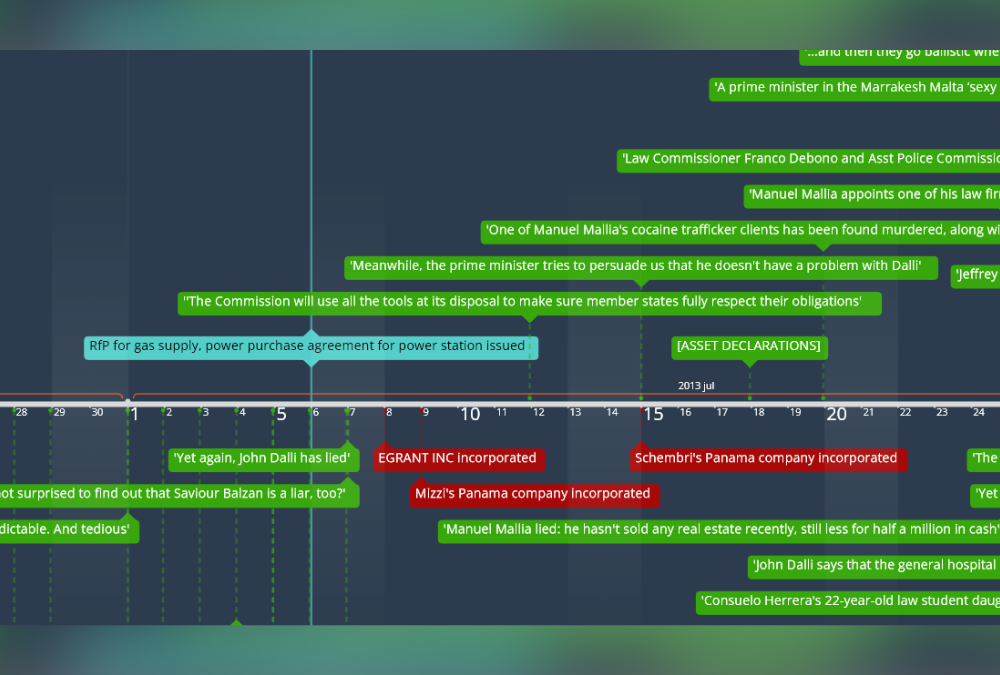This is part two of the annual report summarising the key events of 2013. You can read part one here.
One of the catch-all terms Daphne had come up with to describe deep-seated divisions within Maltese society was ‘The Other Malta’, defined loosely as the segment of the population which thrives within an environment that rewards the worst kind of sentiments that are prevalent within our culture: greed, obsessive competitiveness, amoral familism, and nepotism.
In the seemingly never ending build-up towards the Labour Party’s great sweep to power, it was evident that plenty of people who had been waiting in the wings for a very long time were, by the general elections of 2013, all queued up with their carving knives at hand, ready to swoop in on favours that were owed.
Of course, the Labour Party didn’t invent the concept of corruption, nor does it have a sole claim to it. The Nationalist Party, stagnant and in disarray by the time they received what would be the first of multiple electoral drubbings, had already dipped its toes in scandal. However, it was the Labour Party that unquestionably claimed the mantle of the most corrupt political party to ever infest Maltese politics, and the numbers are there to prove it.
Within the first nine months alone, Daphne’s blog featured posts documenting over 87 appointments to key positions. This figure refers specifically to appointments to permanent or contract-based positions, and does not include the hundreds of direct orders and consultancies which were dished out within that timeframe.
It is also important to point out that the selected appointments in the list below are far from exhaustive given that they are based on documented instances in which key individuals were identified and the appointment was confirmed beyond any reasonable doubt.
Her website effectively served as the equivalent of a notice board for any press releases, news articles, or original stories documenting instances in which Labour Party loyalists were gifted government appointments in exchange for their services to the party.
Further analysis of the appointments listed above provides interesting insight into which sectors the Labour Party prioritised taking over with its loyalists within the first nine months of power. By December 2013, the top five sectors which the Labour government took over through its handpicked party functionaries were as follows:
The arts (culture, heritage etc…): 13 appointments
Law enforcement (Armed Forces of Malta, Malta Police Force, detention services etc…): 11 appointments
The economy (mainly state assets like Malta Enterprise): 7 appointments
Government assets (including Bank of Valletta, Central Bank etc…): 7 appointments
Jobs (key positions within the government’s employment infrastructure): 6 appointments
Summary of key developments throughout the year
Perhaps one of the best examples of the new government’s attitude shortly after it swept to power is disgraced former home affairs minister Manuel Mallia, who now serves as the High Commissioner of Malta to the United Kingdom. At the time, Mallia was in charge of a super-ministry with sweeping powers over the armed forces, the police, correctional services, probation and parole, the infamous citizenship scheme which exists to this day, the public registry and all identity management, the courts, the office of the Attorney General, and public broadcasting.
The first of Mallia’s many public declarations which elicited public outrage and grave concerns was his statement about how he fully expected the board of the Broadcasting Authority, an autonomous body over which the ministry holds no formal power, to resign upon the Labour Party’s ascent to power. Although that specific request was eventually withdrawn, the essence of the demand was clear: anyone who wasn’t loyal to the new regime was to be booted out.
In fact, one of the most high-profile dismissals that year was the termination of popular TVHemm host Norman Vella, who was often critical of the Labour Party and is considered a respected, capable journalist. Not content with Vella’s dismissal, the journalist was later arrested and detained by the police following false reports that he had sent pictures of then chief of government communications Kurt Farrugia and Ramona Attard at the airport which were then published by Daphne on her blog.
The police talked up their charges by claiming that the airport was a “restricted” zone. In actual fact, the courts had made short work of the police’s claims and almost immediately ordered the return of Vella’s property, which was seized when he was arbitrarily detained by the police. Mallia effectively made an example out of Vella, and the disgraced former home affairs minister’s depredation was in turn an example of the power-hungry attitude of a new government which was intent on subverting state norms and weaponising them.
Daphne herself was subjected to severe harassment as well, with the severity escalating from previous threats she had faced throughout her entire career. The most striking incident, which occurred a few days after the Labour Party was elected, was the day in which she was forced to take shelter in a Franciscan convent when she was literally mobbed by a crowd of Labour Party supporters led by Żurrieq mayor Natius Farrugia.
Besides publicly axing popular discussion shows, the disgraced former home affairs minister humiliated the entire police force by ordering them to serve as waiters in a state event, publicly admitted that he sat in for secret service interviews, failed to dismiss his chief of staff after Daphne exposed how he had attempted to abuse his office to obtain access to the VIP section at an Isle of MTV concert, joined his fellow ministers in lying through their teeth in their asset declarations, and even went as far as proposing a legal amendment which would allow the state to fine anyone who ridicules the passports scheme up to €20,000.
Generally speaking, an atmosphere of criminal impunity and power drunk arrogance suffocated every hall of power.
To name but a few notorious examples, disgraced former EU Commissioner John Dalli was welcomed back with open arms and installed as a ‘consultant’ whose phantom job consisted of overseeing reform within public hospitals just a few days after former police commissioner John Rizzo, who later made it clear he was about to issue orders for Dalli’s arrest and prosecution, was dismissed.
Then foreign affairs minister (now whiny president of the republic) George Vella actually had the unmitigated gall to call for better control over the independent press. Nationalist Party turncoat Franco Debono, who was immediately installed as Law Commissioner, and fellow turncoat and Malta Council for Sciences and Technology chairman Jeffrey Pullicino Orlando, instigated a drunken brawl involving a young former Nationalist Party official named Nicholas Azzopardi.
In a piece titled ‘Labour – represented by trash who don’t know the meaning of appropriate behaviour‘, Daphne described the general tone of the administration as follows:
“When journalists criticise politicians, and even when they mock them (that is the role of satire), they are doing their democratic duty. When politicians, particularly those of major political parties and especially those of the party in government, mock, deride and insult the journalists who criticise them and their colleagues, it is an assault on democracy.
Those with a modicum of intelligence will see that this is not being done only to undermine me, incite hatred against me and eventually, silence me. The scope of their motivation is much wider: pour encourager les autres. By making an example of me in this way, what they are deliberately sending out a message to others: “See, this is what happens to those who criticise us, point up our shortcomings, and have the temerity to mock us in public under their own name. If you do the same as this woman, we will target you too.”
And they are right. It is effective. Look at the general silence, the largely dead press. And you know what? I don’t blame them. I blame the Labour Party which, since right back in living memory, has made it its business to lay siege to and erode, by whatever means it can, whether it is silence or outright purchase, freedom of expression, which leads to criticism. Few people have my stamina. Even I wonder, sometimes, where I get it from. Maybe it’s my passionate dislike of bullies, cowards, abusers of power and ridiculous people in general.”
Of course, disgraced former prime minister Joseph Muscat was certainly not one to be outdone by his deeply corrupt ministers and apparatchiks.
While his ministers ran riot and were busy treating their portfolios like fiefdoms, Muscat, his disgraced former chief of staff Keith Schembri, and disgraced former energy minister Konrad Mizzi were busy plotting bigger schemes.
By the end of March, the call for expression of interest and capability for the power station project was issued. By June, within less than three months of the call for expression of interest, Electrogas Malta Ltd had already been incorporated through the Malta Business Registry, signalling a measure of investor certainty about a call that attracted offers from over a dozen bidders.
In July, the request for proposals for the supply of gas and a power purchase agreement for the power station was issued. That same week, the now infamous Egrant Inc., Hearnville Inc., and Tillgate Inc. were incorporated offshore.

Screengrab from our data library.
While the ultimate beneficial owner of Egrant Inc. remains unconfirmed, Hearnville and Tillgate were later identified as the offshore companies which Mizzi and Schembri were going to use to funnel kickbacks from Electrogas shareholder and alleged murder mastermind Yorgen Fenech.
While the power station deal was already generating suspicion among keener observers, we would only get to discover the extent of the corruption surrounding the deal years later.
This was not the case for the Labour government’s shock announcement that it would start selling passports and that Henley & Partners were going to be the sole concessionaires for the extremely lucrative, dubious trade. While the Electrogas deal took years to unpack, it didn’t take European and global bodies as well as various international media outlets long to absolutely decimate Malta’s decision to implement the scheme, a reaction that was so overwhelmingly negative that it even Muscat himself temporarily lost his footing.
By 4 December, a public notice formally announced that Electrogas Malta Ltd were chosen as the preferred bidder for the power station contract. The money laundering machine that was known as Pilatus Bank was incorporated at the Malta Business Registry two days later, on 6 December.


